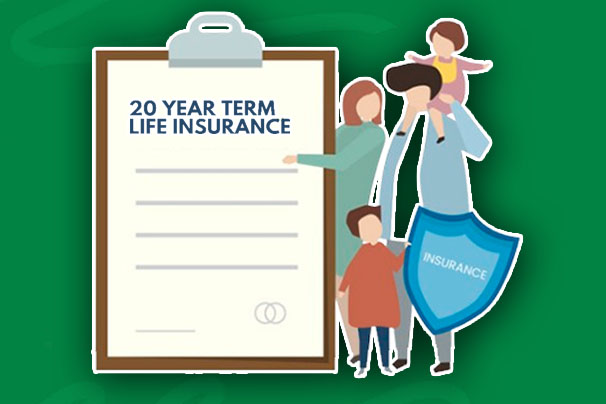When it comes to life insurance, many individuals seek coverage that aligns with their financial responsibilities and plans. One such option is the 20-year term life insurance policy. This insurance is an ideal choice for those looking for temporary yet comprehensive protection.

A 20-year term life insurance policy offers a structured period of coverage with fixed premiums. It thus provides peace of mind during crucial stages of life, such as raising children, paying off a mortgage, or securing other financial goals.
If you’re considering this option, you must understand what this insurance is all about, how it works, and its limitations to ensure it meets your needs and long-term objectives. This article will provide a detailed insight into what this insurance coverage entails.
What is 20-Year Term Life Insurance?
A 20-year term life insurance policy is a type of life insurance that provides coverage for a specific period of 20 years, offering a death benefit to beneficiaries if the insured passes away during the term.
The design aims to offer financial stability for a specified duration, frequently catering to long-term financial commitments like mortgages and children’s education.
With fixed premiums for the term, policyholders enjoy predictable costs, making it an appealing option for those seeking affordable coverage without the complexity of permanent life insurance.
At the end of the 20 years, the policy expires, and the coverage ends unless renewed or converted to another type of insurance. This type of policy can be an ideal choice for individuals looking for temporary protection with specific financial goals in mind.
How Does It Work?
This is simple. Once you purchase coverage, you will have to pay monthly or yearly premiums throughout the term length to ensure your policy is active. If the policyholder dies during this period, the beneficiaries will receive a tax-free cash payment or death benefit.
This fund can be used to cover expenses such as funeral costs, bills, mortgage payments, and extra income, or it can be saved as an inheritance for your children.
After the 20 years ends, the coverage will expire, but you can also choose to renew the policy. Your premiums won’t increase during the duration of your current policy.
However, if you renew or purchase a new policy, your premiums may be higher due to your increased age or risk of health issues.
Benefits of 20-Year Term Life Insurance
This section of the article will discuss some of the benefits of purchasing this insurance policy. Here are a few benefits:
Affordability
A key benefit of a 20-year term life insurance policy is its cost-effectiveness, especially when compared to permanent life insurance products like whole life or universal life insurance.
Term life insurance typically comes with lower premiums, allowing you to obtain significant coverage without straining your finances.
Flexibility
A 20-year term life insurance policy offers the adaptability to meet various financial needs throughout different stages of life.
Whether you’re looking for coverage until your mortgage is paid off, your children graduate, or you retire, this term length can be customized to match your key financial milestones.
Simplicity
Term life insurance is clear and easy to understand. Unlike whole life or universal life insurance, which involve complex elements such as cash value accumulation and investment options, term life policies focus purely on providing a death benefit for the set term, making them straightforward to manage.
Convertibility
Many 20-year term life insurance policies come with a convertibility feature, allowing you to switch to a permanent policy, such as whole life or universal life.
The best part is that you don’t have a medical exam. This feature offers flexibility should your insurance needs evolve and you require long-term coverage.
How Much Does It Cost?
Each individual’s situation is unique, which means the amount of insurance coverage needed will vary. Insurance premiums are often determined by several factors, including:
Age
Premiums tend to be lower for younger individuals, as they are considered less risky to insure.
Health
Your personal health history, family medical background, and the presence of any chronic conditions can affect the cost of your premiums.
Gender
Since women generally have longer life expectancies than men, they may pay lower premiums as a result.
Occupation
Those employed in high-risk jobs may face higher premiums due to the increased likelihood of accidents or injuries.
The aforementioned factors will determine the cost of purchasing this coverage. Hence, you should consider these factors before purchasing coverage.
Is it Worth It?
Deciding if a 20-year term life insurance policy is worth it depends on your personal needs and financial goals.
If you’re looking for affordable coverage to protect your loved ones for a specific period, such as while raising children or paying off a mortgage, it can be a great choice.
The premiums are generally lower than those of permanent insurance policies, making it a cost-effective option. However, if you’re looking for lifelong coverage or building cash value, it may not be the best fit.
Ultimately, it’s worth considering if it aligns with your short-term protection needs and financial situation.
